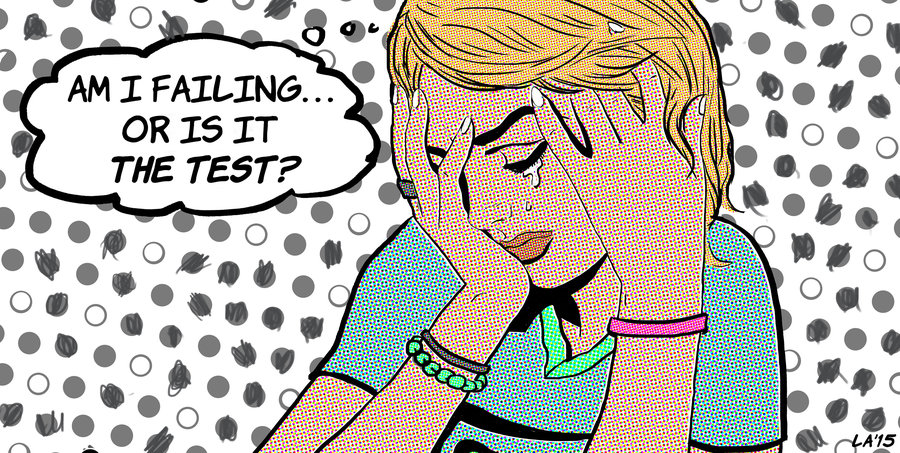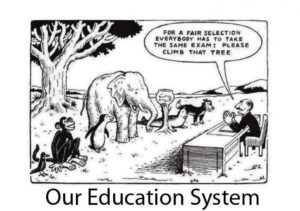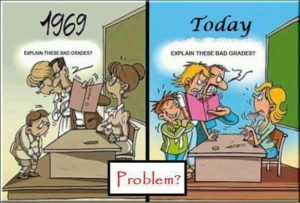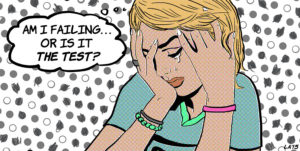
 Ever since the Reagan administration sold the public on the idea that the education system was failing our students, there has been countless misguided attempts to identify the source of a problem that doesn’t exist. Under the 2nd Bush administration, the No Child Left Behind Act (NCLB) attempted to redirect financial resources at the subgroups of the student population in an effort to “close the gap.” The effect of these efforts have been measured by a multitude of standardized assessments. After more than ten years, these efforts proved ineffective. The gap not only wasn’t closed, but became larger.
Ever since the Reagan administration sold the public on the idea that the education system was failing our students, there has been countless misguided attempts to identify the source of a problem that doesn’t exist. Under the 2nd Bush administration, the No Child Left Behind Act (NCLB) attempted to redirect financial resources at the subgroups of the student population in an effort to “close the gap.” The effect of these efforts have been measured by a multitude of standardized assessments. After more than ten years, these efforts proved ineffective. The gap not only wasn’t closed, but became larger.
Under the Obama administration, the Race To The Top (RTTT) program brought something to the forefront that had been swirling around beneath the surface of NCLB. If ten years of focused financial resources and standardized tests didn’t work, then the source of the problem must be the teachers. Thus began the “all teachers are bad” narrative, and concerted effort began to weed out all of the bad teachers and replace them with professionals from other career industries who are experts in their field. Never mind the total absence of educational theory.
The requirements for states to participate in RTTT were few, but by design, were incredibly different outlooks on the education profession. The idea was that teachers are too comfortable in their positions because tenure makes it incredibly difficult to fire them; therefore, bad teachers are protected by tenure. Career teachers not only are a burden to the payroll system, but are also rooted in the old ways and not receptive of new teaching methods. Of course, none of this is even remotely true.
Tenure was among the first things attacked during the early years of education reform in Louisiana in order to meet the requirements of RTTT. What is tenure, and why is important? Tenure is a form of protection that is awarded to teachers after serving a minimum number of years. What protection?
- Tenure protects teachers from being fired for personal, political, or other non-work related reasons
- Tenure prohibits school districts from firing experienced teachers to hire less experienced and less expensive teachers.
- Tenure helps guarantee innovation in teaching by freeing the teacher of the pressure to teach standard lesson plans or teach to a standardized test.
- Tenure allows teachers to advocate on behalf of students and disagree openly with school and district administrators.
- Tenure protects teachers from being prematurely fired after a student makes a false accusation or a parent threatens expensive legal action against the district.
 These are just a few of the benefits to earning tenure. Contrary to the narrative, tenure does not protect bad teachers. It protects good teachers. The problem is that education reformers want to use poor test results as a reason to dismiss a teacher and tenure would prevent that because student outcomes is not entirely dependent on the effectiveness of a teacher. For example, when a teacher takes on the responsibility of an Advanced Placement class, the makeup of the class most certainly is mostly high performing students. When most, or all, of these student score very high on a standardized test, such as ACT, the tendency is to label that teacher a “very good teacher.” It is probable that the teacher is good; however, they could also be mediocre. It is more likely that the students’ intrinsic motivation, family structure, financial resources, etc. contributed to the high scores.
These are just a few of the benefits to earning tenure. Contrary to the narrative, tenure does not protect bad teachers. It protects good teachers. The problem is that education reformers want to use poor test results as a reason to dismiss a teacher and tenure would prevent that because student outcomes is not entirely dependent on the effectiveness of a teacher. For example, when a teacher takes on the responsibility of an Advanced Placement class, the makeup of the class most certainly is mostly high performing students. When most, or all, of these student score very high on a standardized test, such as ACT, the tendency is to label that teacher a “very good teacher.” It is probable that the teacher is good; however, they could also be mediocre. It is more likely that the students’ intrinsic motivation, family structure, financial resources, etc. contributed to the high scores.
Now, consider the teacher who takes on the very difficult responsibility of teaching a low-performing special needs class. Though there are exceptions, it is likely that the students in this class will not perform well on a standardized test such as the ACT. Do we automatically assume that this teacher is bad? No. It is probable that all of the things that made the other class a high performing class are simply barriers to the low performing class.
 What about all of the teachers who teach somewhere between that high performing class and the low performing class? Their student outcomes are a shooting match. You don’t know what your class makeup will be as for as these things go. Is this truly a valid method of identifying bad teachers? No.
What about all of the teachers who teach somewhere between that high performing class and the low performing class? Their student outcomes are a shooting match. You don’t know what your class makeup will be as for as these things go. Is this truly a valid method of identifying bad teachers? No.
What we need to do is abandon this idea that student outcomes identify bad teachers and begin to address what really does. In the next blog, I will identify these things and talk about what it is about the current system that perpetuates the idea that tenure makes it difficult to fire bad teachers.


Agreed: “Tenure” is not the issue. Rather, we as a profession did not adjust our own expectations and standards for obtaining tenure. I attended public school for half of my education. There are a few who had no business being able to carry a union card. Period.
The news of young black males graduating high school illiterate in the 80s and 90s is what opened the freeway to privatization.
Can’t fix what we won’t acknowledge.
Glad we are upping the ante to reclaim our profession… as professional educators who hold each other accountable.
I do believe there are “some” bad teachers, BUT, I believe it all starts at home. We have to make our children want to learn and want to excel in life. We as parents need to make sure that our children are doing their homework and doing it correctly. We need to set standards for our children and inquire at the school about their behaviors and their grades. I can’t help my child when all she brings home is a worksheet and no books or references to look back on. Then there is the blackboard CPSB pays for. It is not used at all. I tried several times last year to look up what was her homework and to see if there was help on there and to no avail there was zilch. If this resource isn’t going to be used, they need to take it down. I’m sure someway somehow our taxes are paying for this website.
As an educator, I do not believe it is a good practice to send homework such as you described, Heather. “Homework” is a reinforcement of learning from class. You are not supposed to have to “teach” your child how to DO the homework. Likely, there is an issue with 1) curriculum mapping and pacing for your child’s grade/district, or 2) reteaching by the teacher as a Tier I differentiation is needed.
Pre-Service teachers are trained in methodology, but not all training programs offer the development courses that teach the teachers WHY they do what they do in the methods coursework/ fieldwork. This is part of our need as a nation: We must recognize the changes – anticipate them, even – and adjust our methods accordingly.
Final note: I would schedule a sit-down with any teacher mighty quickly to discuss any such homework issues that arise this school year. If it is a district curriculum pacing issue, you as a parent have the right via ESSA to have meaningful input into the education policies and procedures of your child’s school.
Have a great 2016-2017!
Kimberly, thank you for your response. We are at a new school this year, and hopefully things will change. Her teacher last year was very difficult to deal with, up to and including bullying her when I chose to opt her out of testing. She even gave her a point deduction for writing to hard with her pencil as well as argued with me that the word “away” had a prefix of “a” and that “way” was a root word. Needless to say it was a long 4th grade year and glad to be out of that school now.